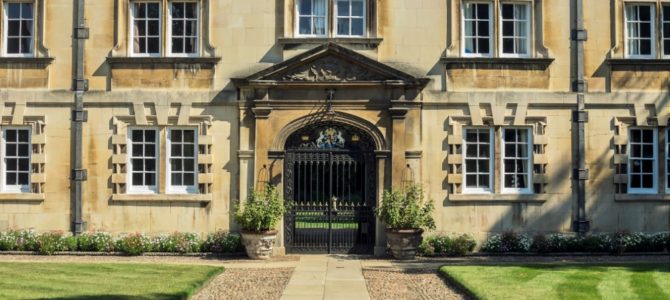
In recent weeks, the United Kingdom’s Cambridge University became embroiled in controversy when as a professor who has deep ties with China discouraged students from discussing the ongoing suffering of Uyghur Muslims.
The professor is Peter Nolan, director of the China Center at Jesus College, part of the University of Cambridge. According to the transcript obtained by Open Democracy, during a meeting in November 2020, Nolan advised students to avoid open discussion about the Chinese government’s human rights violations against Uyghurs because such discussion would lead to “unhelpful” and “contentious” outcomes.
In response to China’s treatment of Uyghurs, Nolan claimed the Chinese government is facing challenges that “all countries that have any kind of minority at all” have faced, and added that there is no “homogeneous, correct view of what is happening in Xinjiang.”
Nolan also discouraged any discussion about Hong Kong because he thought such discussions might offend students from the Chinese mainland. In addition, he worried the college would be “perceived as being a campaigning college for freedom for Hong Kong, freedom for the Uyghurs” if it provides platforms for people who have strong views about China without having someone to present counter viewpoints at the same time.
The most outrageous of Nolan’s comments was his accusation that the World Uyghur Association, a human rights organization for Uyghur Muslims, was financed by the U.S. Congress, and that “its purpose is regime change in China and other parts of the world. So that what you regard in the media as self-evidently true is actually a much more complicated question.”
Following the Money
Since he has deep personal and financial ties with the Chinese government, no one should be surprised that Nolan sounded like a Chinese government apologist.
Nolan’s bio states he has spoken at the Chinese government’s annual China Development Forum since its inception in 2000. Nolan also previously served as the founding director and Chong Hua Chair at the Cambridge University’s Center of Development Studies.
The Chong Hua Foundation, a Chinese charity registered in Bermuda with no website and wrapped in secrecy, funded the chair position with a £3.7 million endowment. According to the Daily Mail, Chong Hua was owned by Wen Ruchun, the daughter of Communist China’s former premier Wen Jiabao. In addition to mentoring Wen Ruchun in the past, Nolan co-wrote a book on China with Wen’s husband.
After retiring from the chair position, Nolan became the director of Jesus College’s China Center, leveraging his connection with the Chinese government and Chinese companies to help the college secure funding from China. For instance, in 2018, the college’s Global Issues Dialogue Centre received a £200,000 grant from the Chinese government. Chinese telecom giant Huawei donated £155,000 to the college as well.
Nolan also serves as a trustee for Cambridge China Development Trust, which received millions from multinational companies with business interests in China. The trust states in its legal filing that it runs an annual training program for CEOs of China’s state-own enterprises. But the British Foreign Office recently disclosed senior Chinese government officials have also participated in the program for years. According to Open Democracy, an arm of the Chinese Communist Party valued the training program highly and praised it for playing a “vital role in China’s interaction with global business.”
Spreading CCP Propaganda
Even though international media has uncovered mountains of evidence of the plight of the Uyghurs, his relationships and financial dealings explain why Nolan repeated the Chinese government’s talking points about Uyghurs. Under the Trump administration, the United States was the first government to declare China’s treatment of Uyghurs a genocide. Britain’s parliament joined those in Belgium, the Netherlands, and Canada to declare that Beijing’s policies against Uyghurs amounted to genocide and crimes against humanity.
After Open Democracy and several U.K. media outlets reported Nolan’s remarks, Tom Tugendhat, chairman of the U.K. Parliament’s Foreign Affairs Committee, called Nolan’s comment an example of the “distortion of academic ideas and academic freedoms” in U.K. universities. Former Tory leader Sir Iain Duncan Smith accused the professor and the University of Cambridge of becoming a “mouthpiece for the Chinese Communist Party.”
But Nolan and the University of Cambridge are hardly outliers. In a soft power play directed by and sometimes funded by the CCP’s United Front Work Department (or “United Front” for short), the CCP has been buying influence at elite universities in the United States, the United Kingdom, and other western democracies for years. One of the United Front’s missions is to control and shape favorable narratives about Communist China, suppressing any unfavorable views, and swaying policy debates about China in the West.
In Plain Sight
Western democracies have underestimated the influence of United Front because its activities are often covert, choosing to exert influence under the cover of many accepted forms in an open society, including establishing language centers on college campuses (such as Confucius Institutes) and making financial donations to elite universities.
According to the U.S. Department of Education, “since 2011, Chinese sources have participated in at least 1,186 donations or contracts worth more than $426 million to seventy-seven American universities.” Gifting to colleges seems natural, given the increasing wealth of the Chinese population and the growing number of Chinese students. But, unfortunately, sometimes those seemingly innocent gifts are tainted by the United Front’s covert involvement.
A Hoover Institute report stated that in 2014, a Chinese university offered a leading Washington, D.C.-based university a $500,000 annual grant to establish a Center for Chinese Studies. Such a lucrative offer came with strings attached: “(1) that a series of Chinese officials and other visitors would be given public platforms for frequent speeches; (2) that faculty from the Chinese partner university could teach China courses on the US university campus; and (3) that new Chinese Studies courses would be added to the university curriculum.” Fortunately, the D.C.-based university turned the offer down.
In Nov. 2017, Foreign Policy reported that the China-United States Exchange Foundation, a Hong Kong-based nonprofit organization, bestowed a new professorship and a new research project on the Johns Hopkins University’s School of Advanced International Studies. The gift raised questions because CUSEF is not an ordinary charity organization. It was founded by former Hong Kong Chief Executive Tung Chee-hwa, who has close ties to Beijing.
At the time this donation was announced, Tung was vice-chairman of the Chinese People’s Political Consultative Conference, an advisory body of the Chinese government and a brainchild of the United Front. Before the funding program at SAIS, Tung’s foundation also funded similar programs at several prominent think tanks, including the Brookings Institution, the Atlantic Council, the Carter Center, and the East-West Institute, to name a few.
The Need for True Transparency
Funding programs at elite universities and leading think tanks is a classic United Front ploy called “influence the influencers” — aimed at strengthening the Chinese government’s influence and getting its preferred narratives presented through influential policy advisers and future policymakers.
Peter Mattis, a fellow at the Jamestown Foundation, explained the United Front’s strategy this way, “If they cultivate enough people in the right places, they start to change the debate without having to directly inject their own voice.” That’s exactly what happened at the University of Cambridge when a highly influential professor repeated the CCP’s talking points to dissuade students from discussing the Chinese government’s human rights violations against Uyghurs.
All elite universities in the West face the same problem: how do they engage in the free exchange of ideas with China without compromising freedom of speech and academic independence and keep the CCP’s covert political influence at bay? The first step to solve this problem is transparency.
Policymakers should put measures in place requiring college administrators to fully disclose their institution’s financial ties with the Chinese government, state-owned enterprises, and any private donations by individuals or foundations with close ties with the CCP. The colleges should require their faculties to do the same.
Sunlight is said to be the best disinfectant, and only transparency can bring accountability. The more students and the general public are aware of who is funding what program on college campuses, the more we can hold the colleges accountable for their commitment to free speech and academic independence.









